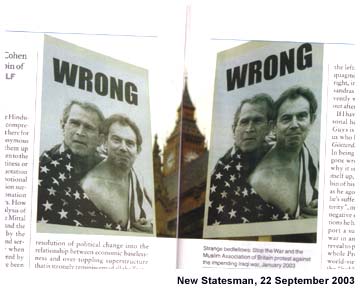
People too often get the impression that the only people who use the nation's civil liberties protections are lawbreakers who were not quite guilty of the exact felony they were charged with. Perhaps we should thank the Bush administration for providing so many situations that demonstrate how an unfettered law enforcement system, even one pursuing worthy ends, can destroy the lives of the innocent out of hubris or carelessness.
There was, for instance, Purna Raj Bajracharya, who was videotaping the sights of New York City for his family back in Nepal when he inadvertently included an office of the Federal Bureau of Investigation. He was taken into custody, where officials found he had overstayed his tourist visa, a violation punishable by deportation. Instead, Mr. Bajracharya wound up in solitary confinement in a federal detention center for three months, weeping constantly, in a 6-by-9 cell where the lights were never turned off. As a recent article by Nina Bernstein in The Times recounted, Mr. Bajracharya, who speaks little English, might have been in there much longer if an F.B.I. agent had not finally taken it upon himself to summon legal help.
Mr. Bajracharya ran afoul of a Justice Department ruling after the 2001 terrorist attacks that ordered immigration judges to hold secret hearings in closed courtrooms for immigration cases of "special interest." The subjects of these hearings could be kept in custody until the F.B.I. made sure they were not terrorists. That rule might have seemed prudent after the horror of 9/11. But since it is almost always impossible to prove a negative, any decision to let a person once suspected of terrorism free constitutes at least a political risk. If officials have no particular prod for action, they will generally prefer to play it safe and do nothing. The unfortunate Nepalese was finally released only because of James Wynne, the F.B.I. agent who originally sent him to detention. Mr. Wynne's investigation quickly cleared Mr. Bajracharya of suspicion, but no one approved the paperwork necessary to get him out of prison. Eventually, Mr. Wynne called Legal Aid, which otherwise would have had no way of knowing he was even in custody.
When law enforcement officials make mistakes, there is an all-too-human temptation to press on rather than admit an error. Brandon Mayfield, a lawyer in Oregon, was arrested in connection with the bombing of commuter trains in Madrid, even though he had never been to Spain. Spanish authorities had taken a fingerprint from a plastic bag discovered at the scene and F.B.I. officials thought it matched Mr. Mayfield's prints, which were among the many from discharged soldiers in the enormous federal database.
The American investigators must have felt they hit pay dirt when they discovered that Mr. Mayfield was a convert to Islam, that his wife had been born in Egypt and that he had once represented a terrorism defendant in a child custody case. The fact that there was no indication he had been out of the country in a decade did not sway them. Neither did the fact that Spanish authorities were telling them that the fingerprints did not actually match. Mr. Mayfield was held for two weeks, even though the only other connections between him and terrorism were things like the fact, as the F.B.I. pointed out, that his law firm advertised in a "Muslim yellow page directory" whose publisher had once had a business relationship with Osama bin Laden's former personal secretary.
When the Spaniards linked the fingerprint to an Algerian man in May, Mr. Mayfield's case was dismissed and the F.B.I. did apologize. But the ordeal could have dragged on much longer if the investigation had not involved another nation, whose police were not invested in the idea that the Oregon lawyer was the culprit. And it could have been endless if Mr. Mayfield had been an undocumented worker being held in post-9/11 secrecy, or if he had been picked up in Afghanistan as a suspected Taliban fighter and held incommunicado at Guantánamo.
For more than two years now, about 600 men have been kept in American custody in Cuba, and the odds are that some — perhaps most — were merely hapless Afghan foot soldiers or bystanders swept up in the confusion of the American invasion. But it took the Supreme Court to tell the Bush administration they could not be kept there forever without giving them a chance to contest their imprisonment.
Anyone who needs another demonstration of how difficult it is for law enforcement authorities to acknowledge error can always look to the case of Capt. James Yee. A Muslim convert, Captain Yee was a chaplain at Guantánamo until he was taken into custody on suspicion of espionage. He was held in solitary confinement for nearly three months, during which time authorities realized that the case against him was nonexistent. Rather than simply let him go, they charged him with mishandling classified material. The charges seemed to have much less to do with security concerns than official face-saving. And to repay Captain Yee for its self-inflicted embarrassment, the military went at great lengths in court to prove he was having an affair with a female officer. While that had nothing to do with security either, it did humiliate the defendant in public, as well as his wife and child, who were present at the trial.
Virtually every time the Bush administration feels cornered, it falls back on the argument that the president and his officials are honorable men and women. This is an invitation to turn what should be a debate about policy into a referendum on the hearts of the people making it. But this nation was organized under a rule of law, not a dictatorship of the virtuous. The founding fathers wrote the Bill of Rights specifically because they did not believe that honorable men always do the right thing.





